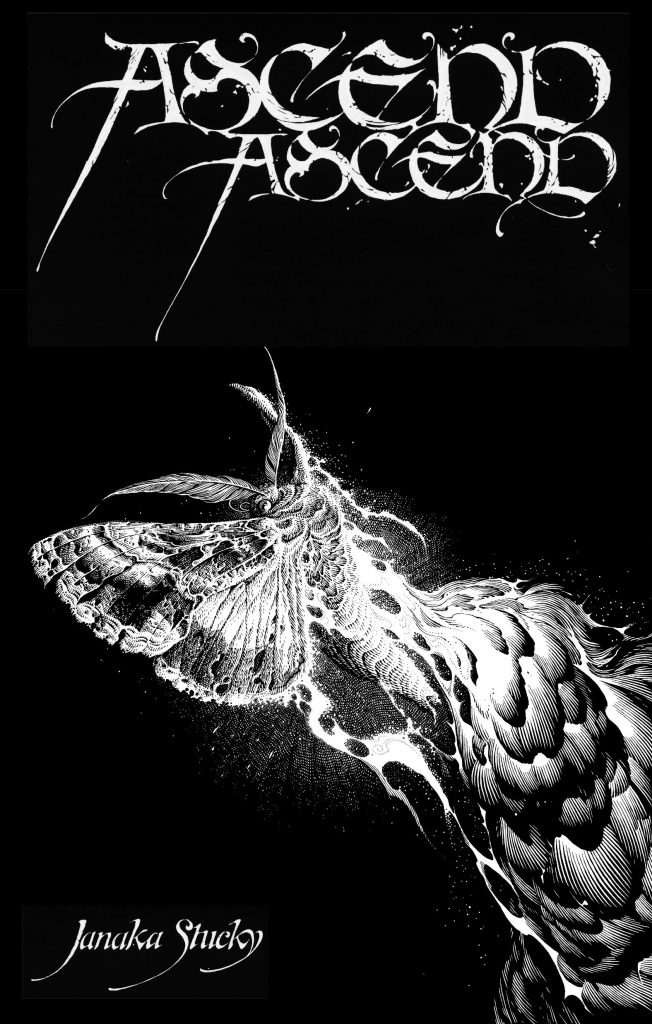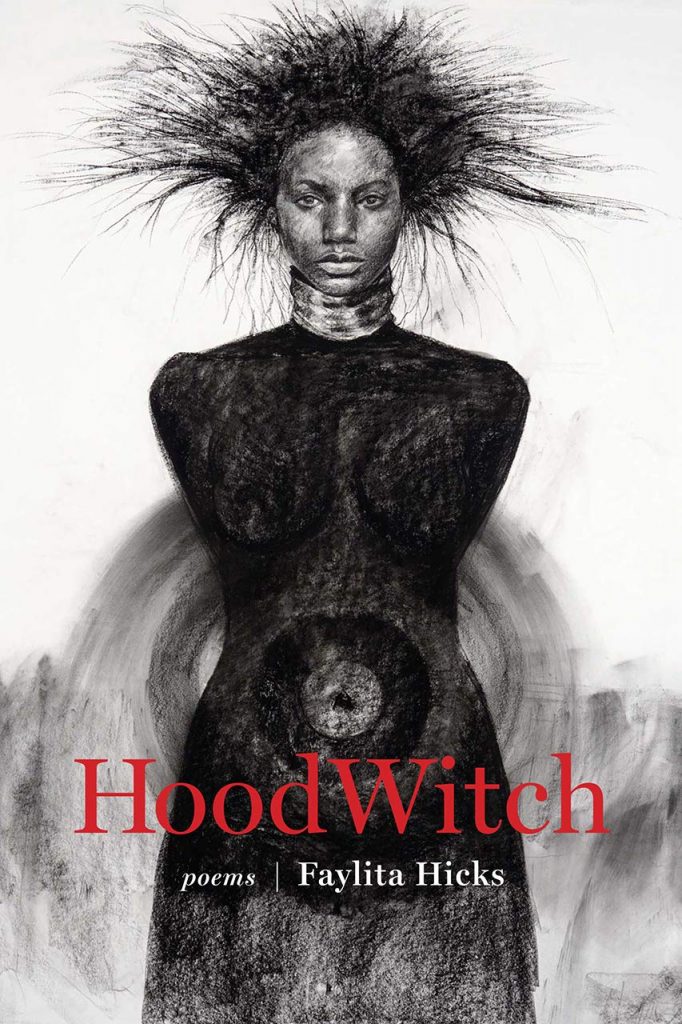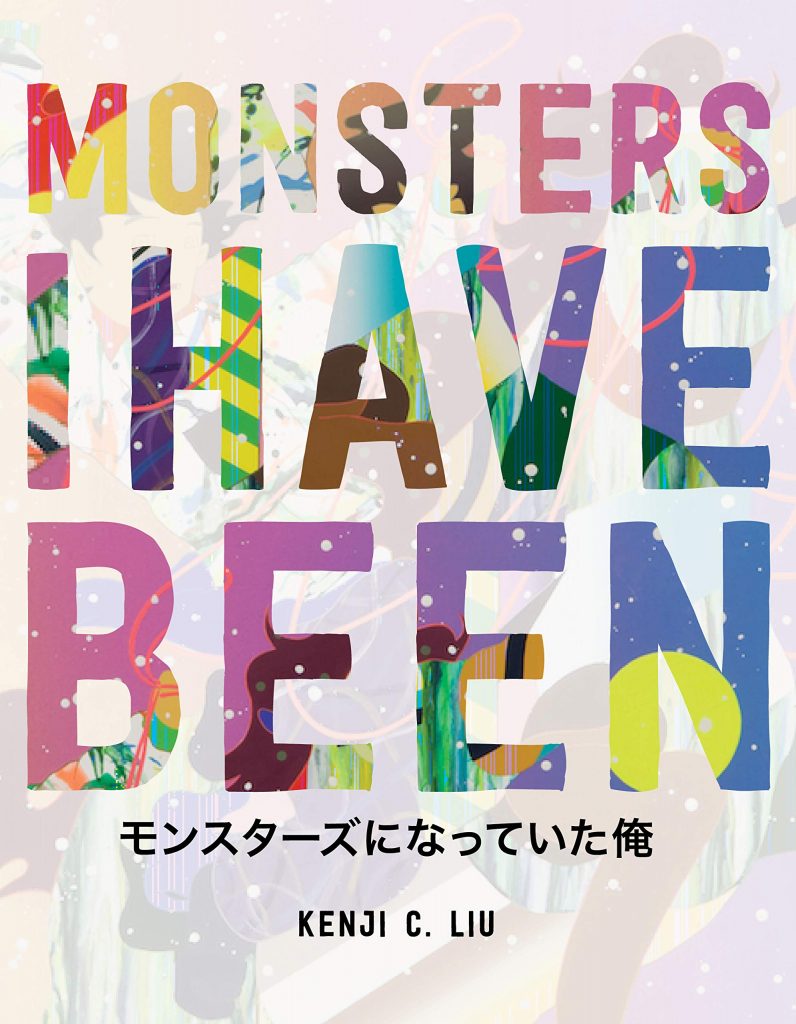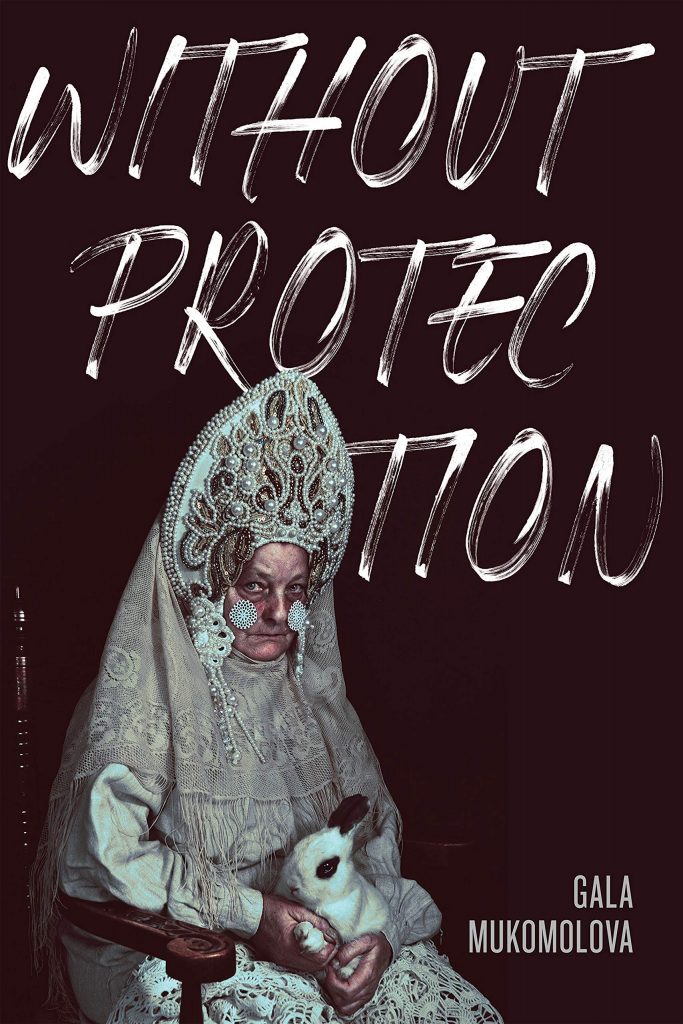




Ascend, Ascend, by Janaka Stucky. Third Man Books, 88 pp., $17.95
A Sand Book, by Ariana Reines. Tin House Books, 323 pp., $24.95
Without Protection, by Gala Mukamolova. Coffee House Press, 88 pp., $16.95.
HoodWitch, byFaylita Hicks. Acre Books, 112 pp., $16.
Monsters I Have Been, by Kenji C. Liu. Alice James Books, 100 pp., $16.95.
Poetry and mysticism have long shared stylistic and theoretical kinship—there is between them a shared trust in associative logic, appreciation for visions derived from dream states, and deep attention to and analysis of iconic imagery. Less noted, but equally significant, is their complicated ambivalence towards power, which they describe, praise, invoke, and challenge.
Catherine Bell, the anthropologist who wrote the book and the book and the other book on ritual studies, says in Ritual Theory, Ritual Practice that the purpose of ritual is to organize power in a community. She notes these practices are most effective when participants hardly feel the sting of giving up their power. They function best when no one notices they have given up anything. Unlike the rituals of, say for example, a congressional hearing, sacramental confession, recitation of wedding vows, or swearing an oath of office, mystical and poetic traditions have long histories of trying (and often failing) to resist being co-opted for political purposes. Spells and prayers and liturgies and all of the other literary elements can be used to distract participants from noticing how much power they are giving up. But they can also be used to call one into full awareness of the power they have to resist compulsory sacrifices to despotic regimes.
A recent surge of interest in occult poetics, from Instagram witches posting lyrical spells to the increased public and critical attention directed at the somatic exercises of CA Conrad, highlights just how thin the line between aesthetic and spiritual practices can be. New works of occult poetics also suggest that any lines between art and politics must be troubled, crossed, or erased if a poet does not want to be co-opted by a patriarchal white supremacist hegemony that has for generations been borrowing the output of this poetics or that one to make their political ambitions more palatable.
I
Janaka Stucky is one among this group of poets self-identifying as witches, basing their poetics on epistemological systems rooted in astrology, undertaking ancestral co-authorships, or otherwise engaging with the literary arts as a ritual practice, with the printed page serving as an artifact of transcendent experience. His latest collection Ascend Ascend contains examples of these kinds of poems-as-artifacts of ritual experiences. In her forward to the book, Pam Grossman reinforces the message that the words printed and bound on the pages are but a shadow of the full literary experience, insisting to readers that if you haven’t witnessed “one of Stucky’s shamanic recitations…in person, you must remedy posthaste.”
On the page Stucky’s poems are evocative litanies that use repetition to create an incantatory effect.
Beyond that, one of the pleasures of reading Stucky’s poems lies in how often his images break with the familiar tropes of mysticism and religious iconography, surprising and making the world seem new through his lyric vision. For example, he writes,
Equally admirable in Stucky’s writing is his use of poetic forms to channel his mystical energy. The use of beatitudes, as quoted above from “I. Assiah, the Material World,” is one example. Other poems use repetitions and parallelism associated with mythic structures to give linguistic ornamentation to the innate beauty in the ecstatic state. In “V. Beri’ah, the World of Creation,” we see similar uses of form:
The meanings of Stucky’s poems in this collection are as mysterious as the messages of an oracle tend to be. These are poems for readers to contemplate in meditative states until they themselves begin, within the deep solitude of their own minds, to sense as the speaker does in “VII. Atziluth, the Archetypal World,” that “I unfold within the now nonbeing.” The poems in Ascend Ascend call the reader to consider everything that could not be called into language, as well as the experiences not translated to the page. Moreover, many readers know, and consider as they read, how the book was written over twenty days in a period of waxing and waning trance states rooted in the Jewish mystical tradition of Hekhalot literature. Stucky himself explains his mystic process in a LitHub essay on occult poetics, “Poetry, Like Witchcraft and Magick, Is an Act of Transformation,” writing, “I don’t write to capture this beatification; I write to find my way into it. What’s left on the page afterward is perhaps not even a trail, or the spell itself but the ashes left from the burning.”
Stucky’s vision of poetry in this collection is ephemeral, experiential, and when reduced to the pages in a book, necessarily incomplete. This approach to invigorating the reader’s imagination is often beautiful in its own right, but it is best understood as inextricably tied to the circumstances of its making. It is also most powerful when considered as an invitation to the reader to act upon and with any energy the poem awakens. Stucky says in his essay on poetics that poetry is “at root a form of radical worship” and “through its creation the creator is changed.” Ascend Ascend is a poetic invitation to contemplate what it means to move through this world with attention to transcendent possibilities.
II
Ariana Reines is another poet who is often associated with somatic poetry, that is poetry generated through ritualized spiritual practices that leave behind literary relics, or the description of the ritual is itself a poetic artifact. Her earlier book Mercury established Reines as one of the key poetic voices writing in a tradition that merges alternative spirituality with lyricism. Readers interested in how the renewed popularity of astrology and the occult might translate into the literary arts will be eager to read her new book. But Reines is a brilliant poet, not someone trying to stay “on brand,” so her new works always open up unexpected questions and aesthetic territory. This latest project, A Sand Book, is surprising for how many of its poems break from the associative or dreamlike logic of the oracular tradition and instead engage with the narrative and linear storytelling techniques more commonly associated with confessional poetry. She challenges readers to consider how alternative spirituality might be expressed in and through other rhetorical modes, which she also refreshes and invigorates.
In A Sand Book the speaker’s daily life, the struggles to find and maintain secure housing, find and maintain employment in workplaces rife with sexual harassment, along with a host of other mundane daily struggles, become their own somatic exercises. The act of writing is depicted in this book as a ritual attempt to make sense of being a spirit and a body in a difficult world. Reading Reines’s poems one feels immersed in a ritual search for meaning and often emerges from the last lines of a poem having found a satisfying one.
In the poem “It Looks Beautiful and I Can’t Understand It Said God,” Reines merges the mundane and the transcendent with a combination of wry wit, elegant elisions in the syntax, and evocative unlikely associations.
From this opening trickle of observations, the sensations in the poem begin to coalesce:
This poem, like many in the collection, reads not so much as utterances from an oracle as it does a behind-the-scenes chat you might have with your oracle while she is on a smoke break. By flattening the distinction between mundane daily life and the otherworldly, Reines imbues both with greater significance and reverence.
While containing many elements readers may recognize as more firmly situated in the tradition of occult poetics, the long centerpiece poem “Mosaic” continues this practice of mysticism embedded in daily life. The otherworldly experience this poem chronicles begins with
the inkling this might be something like the “bliss” I had heard about in old books. I had to sit down. There was even a bench to sit on right there, traffic streaming in both directions. I probably look like an idiot, I thought.
In this state she meditates on rapture, on love, on what it means to feel as if one is being spoken through. “I felt it filling me, and changing me, changing my cells, reorganizing me.” The speaker finds the language to say “I had been going through a difficult time,” and to explicate the unacceptable nature of the circumstances to herself and also to others: “I had a prestigious new job where my direct superior was a tenured creep who liked to taunt me and other female colleagues and students with banter of a sexual nature.”
The balance in this book between highly narrative, conversational considerations of ideas, experiences, and through processes allows her to imbue the spiritual realms with ethical imperatives. There are moral implications and responsibilities to being a spirit connected to the cosmos. The narrative of “Mosaic” unfolds into a litany of aphorisms like: “WE HAVE TO UNDERSTAND OURSELVES AT ALL COSTS / NATURE EXTENDS FROM US” and “THE MOON IS SUPERIOR TO THE SUN INSOFAR AS SHE / HAS HAD THE NIGHT TO KNOW HE IS NOT / THE ONLY GOD IN THE UNIVERSE.” This sense of grounded connection is one of the very satisfying effects of this book. Reines takes her readers on journeys to psychedelic dimensions, but those perceptions are not ends in themselves. Rather, they are meant to lead one deeper into a life in this historical moment under this political regime. Reines’s spiritual poetic work galvanizes and fortifies readers in a sense of commitment and purpose to being full expressions of a cosmic realm.
III
The term “witch” has long been used as a slur against those who live at the margins of society. “Witch” has meant unmarried, powerful, knowledgeable, financially independent, queer, of a darker skin color, practicing a different religion. In Without Protection Gala Mukamolova has reclaimed this word and transformed it into a description for empowerment and strength. Yes, queer, she insists. Yes, independent and knowledgeable. Yes, different. Yes, lawless (by hegemonic standards). Mukomolova even leans into the most lurid aspects of the early modern witch trials, with all of their fantastical descriptions of orgiastic sabbats with the devil, saying of witches in her poems, yes, erotic and ecstatically so.
In her book-length investigation into the Russian fairy-tale characters Vasilyssa and Baba Yaga, Mukomolova creates poems that, in spell-like fashion, channel various powers in the world through magic-laden, erotically powerful experiences. The opening poem, “The Heroine & the Witch,” serves as an introduction to and invocation of Vasilyssa and Baba Yaga. Baba Yaga is presented as a dangerous witch who lives in a house on chicken legs decorated with skulls and inhabited by a cat gnawing its own bone. Vasilyssa is “a maiden undone by the world.” When asked why she has come, Vasilyssa answers, “I come in the name of others and I come in my own name. I come for fire and for you.” Vasilyssa stands at a threshold about to be transformed from a victim of this world into something else. Mukomolova writes, “The House regards her heroine. ‘You’ll do.’”
From this mythic realm, Mukmolova draws us into a modern world readers will find familiar. The concept of the witch is reconsidered from within the life and memories of a confessional speaker. In “Return” Mukomolova describes the girlhood of a child whose family has disavowed Russia to claim refugee status. She begins by quoting the great Russian poet Tsvetaeva, “There are poets with history and poets without history.” She goes on to write, “We, the daughters between countries, wear our mean mothers like scarves around our necks.” Attempting to describe the sensation of not being understood at home nor at school, among adults nor peers, as a consequence of the vulnerabilities and traumatic memories that accompany such displacement, the speaker is “a girl with a hole in her throat, every day I opened the translation book.” She laments, “We had no songs, few rituals. On Yom Kippur, we lit a candle for the dead and no one knew a prayer.”
Vasilyssa’s journey from innocence to experience, from maiden into a crone-like Baba Yaga figure powerful in her own right and slandered by those who fear female power, is told through scenes of erotic encounters. The recounting of these sexual experiences becomes almost ritualistic. The poems have the capacity to be both carnal and spiritual because they are about sex and also about all of the questions and ways of being sex touches. Mukomolova tells readers in the end notes that the poem “Received” is “a found poem and an entry into my erotic archive.” It is composed entirely out of an email from the speaker’s first girlfriend “written shortly after we fucked for the first time.” It contains excerpts from Rosemary Franklin’s article on The Awekening. Mukomolova says the email is “a classic example of projection and also notes the quoted excerpts were “never attributed to their source.” In the poem itself we see sexuality understood as a connection to a form of divine power. “A feeling of exultation overtook her, as if some power of significant import had been given her to control the working of her body and soul.”
This book also considers why such a realization about sex might be received as a revelation by a young woman. The answer of course is the prevalence of abuse, trauma, misogyny, and homophobia. In “Coney Island Vasya” we see a young girl discovering the magic and power of the sea.
But this important revelation is interrupted when “two men follow her.” Instead of learning about an oceanic sensation, she is forced to ask, “How does the seagull sense the crab below sea foam and silt?” The terrible answer is “She knows their call and that is all she knows.” The erotic becomes the place of accusations and bedevilment.
In “Vasilyssa Considers the Dark Path,” the speaker struggles to imagine the power of knowing one’s body as a power, and to overcome a fear rooted in the horror of Baba Yaga’s powerful form. She writes,” it’s not darkness/ that scares her.” No, it is the house of Baba Yaga, the place of feminine power,
Faced with sensations that have been oppressed, repressed, subsumed, the speaker is afraid:
She has been trained to fear the crone within her, a fear that distracts her from the power of adult womanhood that is hers and any girl’s birthright.
And so the speaker needs rituals, songs, and language for overcoming fear and helplessness. Each poem in the book has a more powerful magic than the one before. In “The Key to All Locks Is a Fearless Heart,” Vasilyssa undertakes a heroine’s journey, “rides the back of a black bear forward, knows hunger and cold. / Vasilyssa rides the back of a black bear to the right, her horse drops dead.” She befriends Baba Yaga at last, brushes bats from Baba’s hair and begins to learn the wisdom she needs to survive and to return. She leaves tricks to keep the horses alive, answers to riddles meant to thwart her: “Dear, life is not the only thing on earth.”
Protection spells are among the most common practicing witches will attempt to cast. By the end of this book, in the poem “I was a warm live thing,” the speaker does not need the persona of Vasilyssa to tell us the grief of having lived without such a charm. “I was a warm live thing that wanted / to be loved above all others.” It is so difficult to find language to say the protective circle of chalk or salt or one’s own family has been broken. But Mukomolova has found the words and they are a gift for readers who may also have been looking for them.
It is devastating to imagine the moon, such an archetypal figure of feminine power, ripped away. But consider how Mukomolova’s poetic rituals of the erotic find ways to call that power back. In “X,” a poem about kink and bondage and erotic spirituality through feminine power, she writes,
The speaker does not want the closed circle of the protection spell. She wants to be open to the full force of the sky.
IV
Faylita Hicks’s HoodWitch is deeply influenced by Vodou spiritual practice and philosophy. The book itself is divided into three sections—The First Rite of Water, The Second Rite of Flesh, and The Third Rite of Smoke—that are demarcated by veve images of various loas. In its evocation of witchcraft, this book provides further examples of efforts to reclaim the language of witchcraft and demonology from the accusers and to repurpose the language to assert a femme vision of authority and autonomy. This book is also powerfully intersectional in its vision, emphasizing specifically black diasporic relationships with witchcraft and also attending to the particular violences and precarities that haunt black girlhoods.
At its core a book of protection spells for girls, HoodWitch begins with “About the Girl Who Would Become a Gawd,” a poem that describes a lifetime of microaggressions and alienations that might make a girl lose track of the divine spark inherent in her humanity.
As the poem that sets the tone for the book, this piece describes a spiritual path that is arduous and physical, a transcendence that requires personal and political engagement in the material realm. She writes,
In “The Birth Mother’s Red Bath for Courage,” Hicks describes the process of giving birth as an experience rich with ritual energy, but also a terrifying one where blood and death are ever-present, and radical transformation is a certainty. The speaker, who will give the child up for adoption at the end of this process, seeks guidance and strength.
This key poem in The First Rite of Water, dedicated to Papa Legba, a loa in Hatian Vodou invoked when humans try to connect with the gods ends on a note unfulfilled searching: “Some nights, I think this body / must still be praying to a god / that has long since slithered away.” The poems are powerful and resonant in their honest depiction of the grief from feeling abandoned by the gods.
Through her compassionate attention to the struggles and suffering of other mothers and daughters, including transgender people, the speaker begins to find channels of communication to the divine beyond this life and within in. It is a frightening and dangerous eye of the needle that black girls in particular must pass through, and through Hicks’s attentive rendering of the experience, readers can begin to see the kind of power that might await a girl on the other side. One great purpose of magic, Hicks suggests in “Photo of X, 2007: HoodWitches” is that there is a power in self-love and love for one’s community, even and especially the parts that might be mocked or degraded by outsiders. She writes,
In this poems Hicks merges regional dialects and the rhetoric of social media with the rhyme schemes and meter of poetic forms, for the purpose of creating a praise song of love for “my black girls gone missing. /to my sisters gone missing. / to our daughters & granddaughters.” By the time she reaches the third section of the book, The Third Rite of Smoke, written under the veve of Baron Samedi, a death loa, the speaker seems to have discovered that on the other side of a terrible suffering comes a power to create and expand a circle of protection and security. She writes in “All It Took to Get to You,” that
Hicks’s book, like most other poetic works that engage with religious traditions that have been termed alternative or occult, is equally interested in the political and the magical. The poems are explicitly intersectional in their feminism, as the language of feminine and black power that are at the core of a Vodou spiritual practice can hardly be written about without consideration of how to represent the experience of trans, queer, bipoc people, and anyone else who would lend their energy to calling a more just world into being.
V
Monsters I Have Been by Kenji C. Liu reinvents monstrosity through techniques that are reminiscent of the ways feminists have reimagined the figure of a witch not as an evil being but an icon of resistance. As the editor who drew together fourteen poets to write spells in response to SCOTUS and POTUS for Unmargin’s special feature “Incantations: The SCOTUS Decision in Trump v. Hawaii,” Liu is a writer deeply versed in the aesthetics of resistance and redefinitions at the heart of occult poetics and new approaches to witchcraft. The monster in Liu’s poems, like the witch, transcends rigid cultural mores and strictures creating an uncanniness that troubles the imagination of the powerful and complacent.
Liu is also adept at creating multi-layered language and in his poems the concept of the monster undergoes many twists and turns. In poems throughout this book, Liu uses a form he calls “frankenpo” in which he collages found text “for the purpose of describing or revealing new meanings often at odds with the original text.” These frankenpos are composed of texts from askmen.com, quotes from Sei Shōnagon, and celebrity sexual misconduct apologies, among other documents. In “The Monstrosity: Notes Towards a Frankenpo” Liu explains his embrace of a “monstrous” form as part of an “experiment with minimizing the Western, hyper individuated confessional self.” He wants his poems not to fixate on the monsters within, but rather to understand how injustices are culturally constructed layerings of history. He wants to contextualize the writers’ work as “a cultural point of view. The subject is not solid, but a construction—of history, race, class, gender, religion, and more.”
He confronts the monster of heteronormative patrariarchy through irony, critique, and subversion in poems like “Teaching Men to Be Emotionally Honest” when he writes,
In “She People! 10 Apologies,” he writes lines like, “My behavior cannot have been seriously sincerely remiss, a double-digit nothing. I deserve a super-hero investigation.” Elsewhere, drawing on work by the philosopher Walter Benjamin and artist Paul Klee, Liu writes about the monstrous angel of history as “a witness to the wreckage of modernity, the angel is itself patched together from different beasts. A monstrous presence is needed to respond to monstrous times.” This is in contrast to
the angelic floating white woman in John Gest’s 1872 painting American Progress [which] is a celebration of the colonization of North America, and she is also a monster. An eroticized symbol of an expansionist, selectively benevolent state, beneath the exteriority she is Frankenstein’s monstrosity, patched together from genocide, slavery, capitalist exploitation….
In this collection, Liu seeks to discover creative acts that can look not to this monstrous muse of history, but to “create from what is in front of us, and that is a kind of future. It exists not to produce use-value, but to create beauty.”
We can see him achieving this goal of infusing in his poetry a magic that remakes our sense of ourselves in the world in, among many other poems, “Visa,” which collages texts of Presidential Orders 13769 and 13780 (Protecting the Nation from Foreign Terrorist Entry into the United States) and Octavia Butler’s The Books of the Living. Out of monstrosity, with an eye on what can be made beautiful from what is in front of us, come exquisite lines like, “Our love in a time / of inappropriations / of malicious inadmissibility” and “case by case life / remains / in the shape / of prayer.” The frankenpo ends with steely resolve.
It is empowering and revelatory to read work by a poet who believes so deeply in the divinatory capacities of language and who can also overcome the Cassandra-like curse on many prophets and make his vision of a better future a reality before our eyes.
I became interested in witchcraft when my home state of Missouri closed the third-to-last clinic in the state that provided abortions. (At the time of this writing Planned Parenthood was involved in a protracted legal dispute in an attempt to keep the doors open to the last such clinic.) Listening to the discouraging hourly news updates, I remembered having heard once that medieval witches had been midwives, persecuted for providing birth control. I began reading the transcripts of their trials, wanting to know methods and recipes and spells, in case I should ever need them in a terrible future that any of us could have divined was coming.
How many of the accused were actually midwives and how many could really offer clients reliable birth control is a much smaller number than I hoped. I thought for awhile that I had not even found magic in those transcripts, only the relentless cruelty of a patriarchal theocracy and the powerful defiance of marginalized people spitting in its face. But after reading these poetry collections I understand now that in those transcripts is a very powerful and essential expression of magic. And great poems too. So much lyrical magic was in the dying woman’s curse Agnes Naismith laid over the mob about to hang her in Paisley. Such a powerful meter must have activated the divination the Wise Wife of Keith whispered in King James’s ear before he convicted her of witchcraft and ordered her execution.
In these contemporary poetry collections we see echoes of the fearless magic coursing through the Brazilian witch Maria Gonçalves Cajada when she told a seventeenth–century tribunal, “If the bishop has a mitre, I have a mitre, and if the bishop preaches from the pulpit, I preach from the cadeira.” If one is to be subjected to the bedeviling language of autocrats and their willing functionaries, it is good to be offered the intellectual and emotional relief of a protection spell made by such powerful poets in their most potent, evocative, incantatory, beautiful language.
Kathryn Nuernberger’s third poetry collection, Rue, is forthcoming in 2020 (BOA). The End of Pink (BOA, 2016), won the 2015 James Laughlin prize from the Academy of American Poets, and Rag & Bone (Elixir, 2011) won the 2010 Antivenom Prize.
